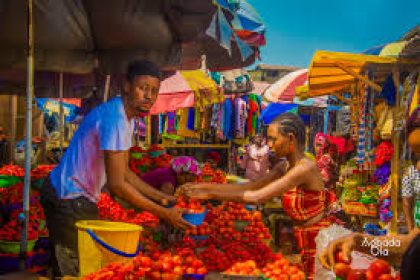
In June, Nigeria’s inflation hit a 28-year high of 34.19 percent, inflicting hardship for many Nigerians. The issue is exacerbated by a 40.87 percent surge in food inflation, which is blamed on instability in the country’s agricultural regions. As a result, many people are unable to buy basic food supplies.
According to the UN’s State of Food Security and Nutrition in the World 2024 assessment, over 172 million Nigerians, or 78.7 percent of the country’s population, could not afford a decent meal in 2022.
According to the analysis, a Nigerian who could afford a healthy diet in 2022 would need to spend approximately $3.83 per day.
This difficulty has caused many Nigerians to shift their tastes, preferring cheaper native foods like cocoyams and soybeans.
Cocoa yam, recognised for its rich, nutty flavour and adaptability, has become a popular substitute for rice and gari. Vendors in bustling marketplaces, such as Wuse and Utako in Abuja, now proudly display pyramids of cocoa yam, which is more popular due to its cost and nutritional content.
“I used to buy rice and gari,” explained Mrs Anne Ikechukwu, a mother of three. “But, with prices skyrocketing, I needed to find an alternative.” Cocoa yam is not only less expensive, but also more nutritional. It has become a staple in our household.”
Ikechukwu’s remark echoes the experiences of many Nigerians who have had to change their diets. In her culture, cocoa yam has substituted rice in a variety of traditional foods, including soups, stews, and desserts. Its versatility in the kitchen has made it a popular choice among families looking to stretch their food budget.
Aside from cocoa yam, another popular indigenous meal is soybean cake, a protein-rich dish prepared from fermented soybeans. Soybean cake, or wara, was once a niche product but is now commonly accessible on Abuja’s streets.
Mr John Opaluwah, a civil worker, described his experience: “I was hesitant at first, but wara has become a mainstay in my household. It is not only delicious, but also economical. It is an excellent source of protein, especially given how costly meat has gotten.
Wara’s popularity reflects a larger trend in which Nigerians are rediscovering ancient dishes that were formerly eclipsed by more regularly consumed staples. For many people, wara is a low-cost alternative to high-priced meat, giving a nutritional option that is easy on the wallet.
The inflation issue has also caused a move away from pricey foods, such as tomatoes. Tomatoes, once a staple of Nigerian cuisine, have tripled in price in recent years, prompting many people to look for substitutes.
Mrs Ashifa Ahmed, a merchant from Abuja’s Bwari neighbourhood, revealed, “I used to buy a plate of tomatoes for N500, but today it costs more than N1,500. Vegetables like spinach and bell peppers are not only less expensive, but they also add flavour to my stew. I’ve discovered that these options can improve my cuisine in fresh and exciting ways.”
Speaking with our correspondent, a mother of four, Ojone Adams, stated that she had reduced to parched maize and beans as regular meals for her family due to the cost of The inflation issue has also caused a move away from pricey foods, such as tomatoes. Tomatoes, once a staple of Nigerian cuisine, have tripled in price in recent years, prompting many people to look for substitutes.
Mrs Ashifa Ahmed, a merchant from Abuja’s Bwari neighbourhood, revealed, “I used to buy a plate of tomatoes for N500, but today it costs more than N1,500. Vegetables like spinach and bell peppers are not only less expensive, but they also add flavour to my stew. I’ve discovered that these options can improve my cuisine in fresh and exciting ways.”
Speaking with our correspondent, a mother of four, Ojone Adams, stated that she had reduced to parched maize and beans as regular meals for her family due to the cost ofThe inflation issue has also caused a move away from pricey foods, such as tomatoes. Tomatoes, once a staple of Nigerian cuisine, have tripled in price in recent years, prompting many people to look for substitutes.
Mrs Ashifa Ahmed, a merchant from Abuja’s Bwari neighbourhood, revealed, “I used to buy a plate of tomatoes for N500, but today it costs more than N1,500. Vegetables like spinach and bell peppers are not only less expensive, but they also add flavour to my stew. I’ve discovered that these options can improve my cuisine in fresh and exciting ways.”
Speaking with our correspondent, a mother of four, Ojone Adams, stated that she had reduced to parched maize and beans as regular meals for her family due to the cost ofThe inflation issue has also caused a move away from pricey foods, such as tomatoes. Tomatoes, once a staple of Nigerian cuisine, have tripled in price in recent years, prompting many people to look for substitutes.
Mrs Ashifa Ahmed, a merchant from Abuja’s Bwari neighbourhood, revealed, “I used to buy a plate of tomatoes for N500, but today it costs more than N1,500. Vegetables like spinach and bell peppers are not only less expensive, but they also add flavour to my stew. I’ve discovered that these options can improve my cuisine in fresh and exciting ways.”
Speaking with our correspondent, a mother of four, Ojone Adams, stated that she had reduced to parched maize and beans as regular meals for her family due to the cost of The inflation issue has also caused a move away from pricey foods, such as tomatoes. Tomatoes, once a staple of Nigerian cuisine, have tripled in price in recent years, prompting many people to look for substitutes.
Mrs Ashifa Ahmed, a merchant from Abuja’s Bwari neighbourhood, revealed, “I used to buy a plate of tomatoes for N500, but today it costs more than N1,500. Vegetables like spinach and bell peppers are not only less expensive, but they also add flavour to my stew. I’ve discovered that these options can improve my cuisine in fresh and exciting ways.”
Speaking with our correspondent, a mother of four, Ojone Adams, stated that she had reduced to parched maize and beans as regular meals for her family due to the cost of rice, yam and other staples had become unaffordable to her.
“I go to the market with N20,000 and grind dried maize and beans to prepare swallows and bean cakes for my family. “I also use the beans in a soup recipe for the swallow,” she explained.
Adams was concerned about the steady rise in food prices. “There is not enough money to buy a balanced food, and what we can afford with our limited salary is insufficient to meet our health needs.
“I just saw my eyes turning since I hadn’t eaten enough protein and vegetables. I was able to buy some beverages for immediate relief, but how long will that last?” she complained.
According to NBS, the national average cost of a healthy diet will rise 19.2 percent to N1,241 per adult per day in June 2024.
It had regional variations ranging from N1,545 in the South-West Zone to N956 in the North-West Zone, and state-level variations ranging from N1,640 in Ekiti to N878 in Katsina, representing a 45% increase from January 2024, driven by rising vegetable, legume, nut, seed, and starchy staple prices.
The United Nations also recently forecasted that over 82 million people in Nigeria will go hungry by 2030.
Several causes contribute to this issue, including continuous wars, the effects of climate change, growing inflation, and rising food and non-food commodity prices, which are attributable in part to the naira’s depreciation and the withdrawal of the gasoline subsidy.
Persistent conflict in the northeastern states of Borno, Adamawa, and Yobe exacerbates food insecurity.
According to a survey from the National Bureau of Statistics, food and basic item costs have surged, increasing by more than 250 percent in one year. For example, the price of beans increased by 252% from June 2023 and June 2024.
The survey also stated that the prices of main staple goods such as beans, yam, potatoes, plantains, and tomatoes had risen by more than 250 percent in the previous year.
Specifically, the average price of 1kg of brown beans was N2,292.76, up 252.13 percent from N651.12 in June 2023 and 14.11 percent month on month from N2,009.23 in May.
Afrinvest, an investment holding company, examined the three-year development trajectory of Nigeria’s seventh largest sector, GDP, and discovered a mixed performance across industries.
According to the research, the agriculture industry has declined from 2.1% in 2021 to 1.9% in 2022 and 1.1% in 2023. It fell further to 0.2% in Q1 2024. This development could be attributable to the sector’s vulnerability to climate change and the limitations presented by rural infrastructure.
Experts emphasise that the transition to less costly veggies demonstrates Nigerian consumers’ creativity and adaptability. With some ingredients becoming prohibitively expensive, many people have had to get creative in their cooking, discovering new ways to prepare meals that are both economical and flavourful.
Shadrach Israel, an economist with Lotus Beta Analytics, commented, “While these changes in dietary habits reflect Nigerians’ resilience, they also highlight the ongoing struggle against food inflation.” Despite ingenious adaptations, many people continue to endure hunger.
“The reliance on indigenous foods demonstrates Nigerians’ inventiveness, but it also shows the urgent need for long-term solutions to address the underlying reasons of food inflation. As the country confronts these difficulties, it is critical to focus on supporting local farmers and investing in agricultural infrastructure.”
For example, the government and several non-governmental organisations have worked to improve agricultural methods and boost food production.
Initiatives like the National Agricultural Technology and Innovation Plan seek to boost production while also ensuring food security. However, experts warn that much more effort needs to be done to stabilise food prices and guarantee that all Nigerians have access to inexpensive, nutritious food.
Local farmers are at the centre of this initiative. Farmers in rural regions are implementing more resilient farming practices and diversifying their crops to reduce reliance on imported goods and offset the effects of climate change.
Farmers in Benue State, noted for its fertile agricultural area, are experimenting with novel crop varieties and practices to boost yields while lowering expenses.
In addition to assisting farmers, there is an increased emphasis on food security programs. Community-based initiatives and cooperatives are aiming to educate people about sustainable farming practices and nutrition. These programs serve to ease the immediate effects of food inflation while also contributing to long-term food security.
The Managing Director of Saro Africa, Rasheed Sarumi, emphasised the vital role of agriculture in driving Nigeria’s economy.
He noted that despite improvements in productivity and production, inflation remained a concern, and the government’s involvement in agriculture over the past 50 years had not yielded significant change.
He advocated private sector involvement, saying, “The government should realise its limitations and allow the private sector to bring innovation and capital to drive food production.”
Sarumi highlighted Nigeria’s comparative advantage in agriculture but identified insecurity and high inflation as major challenges.
He expressed optimism about the potential for growth in the agricultural sector, stating, “We are working with the government to address these issues and ensure the private sector can drive growth in the agricultural sector. Excess agricultural output will lead to sustained industrialisation.”
The Minister of Agriculture and Food Security, Abubakar Kyari, assured that the Federal Government had put measures in place to address the issue, including boosting farming activities to increase food production.
“We expect a bumper harvest around October-November this year, barring any natural issues,” Kyari stated on Channels Television’s Sunday Politics. “I assure you, we will have a bumper harvest.”
Kyari attributed the current acute food shortage to seasonal factors. “The season we are in now is critical for agriculture. This lean season, which spans June to July, precedes the next harvest,” he explained.
He also cited other contributing factors such as reduced land availability, flooding, habitation problems, and insecurity.
“There’s a shrinkage of land for agriculture, flooding, habitation problems, and an ageing farming population. Younger people are not entering agriculture,” Kyari noted.
To mitigate these issues, the government is pushing for mechanised farming by distributing fertilizers to farmers and purchasing tractors.
“We have ordered 200 tractors and 9,000 other implements from Belarus. The basic farming tool in Nigeria is a hoe, which is archaic. That’s why we are focusing on mechanisation.
“The journey towards overcoming food inflation and ensuring food security will be challenging. It requires a multifaceted approach, including supporting local agriculture, improving infrastructure, and fostering community resilience.
“As Nigerians continue to adapt to their new reality, the focus must remain on creating a sustainable and equitable food system that can withstand future challenges,” Israel noted.

